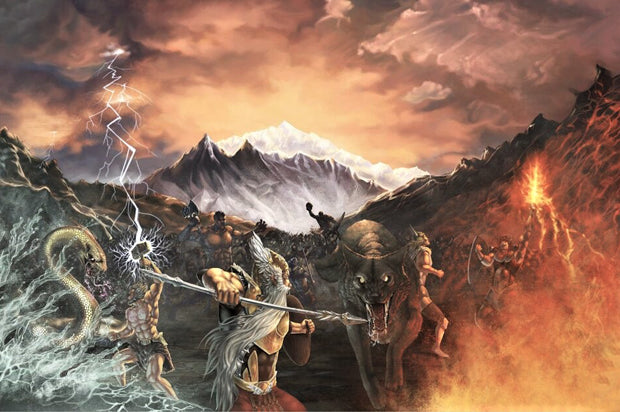Ragnarok
In Old Norse, the word Ragnarok means "Fate of the gods". Viewed as the cataclysmic destruction of the Nine Realms and everything in it, the story of Ragnarok comes at the very end of Norse mythology. For the Vikings, it was a prophecy of what was to come at an unknown time in the future. There are two versions of the Ragnarok and while both foretold of the end, one foretold of a rebirth.
It all begins when the Norns predicted a Great Winter called Fimbulwinter. The Norns were inscrutable spinners of fate and they predicted that the Fimbulwinter would be unlike any other winter the world has ever seen. Biting winds will blow snow in all directions, the sun will cease to shine and the world will feel only unprecedented cold. This shall last for three winters with no summer in between. Mankind will have lost their source of food and other necessities. All law and morals will fade leaving only the need to survive. It will be an age of extreme brutality. Brother against brother, father against son, and daughters against their mothers. It is during this time that the wolves, Skoll and Hati, the hunters of the sun and moon in the skies since time began, will at last catch their prey. The stars, too, will disappear leaving nothing but darkness and emptiness in both heaven and earth.
The great tree of life, Yggdrasil, will tremble and all the mountains and the trees will fall to the ground. Fenrir, the wolf, will break free of his chains and Jormungand, the serpent who roams the oceans, will circle the land and rise from the depths of the sea. It is then that the Aesir gods discover Loki's treachery. For when the convulsions shake up the ship Naglfar free, it will sail easily over the flooded earth. Its captain is Loki, now free from the chains that bound him. His crew an army of giants.
Fenrir will run across the earth devouring everything in his path. His lower jaw to the ground and his upper jaw against the top of the sky, nothing and no one is safe. Jormungand will spit his venom across land, sea and air poisoning anyone and anything within reach. As if to say that was just the beginning, fire giants from Muspelheim emerge from the sky. Surt, their leader, holds a flaming sword brighter than the sun. He marches his army across the Bifrost making his way to Asgard. As they walk across the rainbow bridge, it breaks and falls behind them. Heimdall, in warning, blows the Gjallarhorn announcing the arrival of the giants and the beginning of Ragnarok.
Despite knowing what the prophecy has foretold of this battle, the gods decide to go to war. All the while, Odin consults the head of Mimir for counsel. Together the gods arm themselves and head to Vigrid where the battle begins. Odin takes on Fenrir, with him are his soldiers the Einherjar. They will fight more valiantly than anyone has ever fought before. This was, after all, the very reason why they were chosen to train alongside Odin in Valhalla. Still, their efforts would be in vain. Fenrir would swallow them all. Vidar, one of Odin's sons, sees this and burning with rage charges towards Fenrir with the intent of avenging his father. He had prepared for this very moment. Vidar wore, on one of his feet, the shoe crafted for this very purpose. It was made from scraps of leather that were discarded by the humans. He held Fenrir's mouth open and stabbed his sword through Fenrir's throat, killing him and avenging the death of his father.
On all sides of the battlefield different battles were being fought. Tyr battled another wolf by the name of Garm. Loki met his defeat in the arms of Heimdall but at a heavy cost as he, too, lost his life. Freyr and the giant leader, Surt, fought each other while Thor battled Jormungand. With the help of Mjolnir, Thor defeated the great snake but at the cost of his own life as he succumbed to his injuries soon after. Jormungand covered Thor with so much venom that after his death, Thor was only able to take nine paces before he fell on his knees, took his last breath and died. His blood added to the already bloody soil of Vigrid.
After the great battle, allthat remains of the would sink to the sea and there would be nothing left but a great void. Here then lies the contradiction of how the Ragnarok ended. Some say this was the end, while others say that from such great destruction came the beauty of a new world. Few gods would have survived, Vidar, Vali, Baldur, Hodr and Thor's sons, Modi and Magni. Together with the gods, a man and a woman by the name of Lif and Lifthrasir who had hidden themselves in the Wood of Hoddmimir, would live and populate the new world.
The myth of the Ragnarok also served as an example of human actions for the Vikings. It gave them hope and inspiration. We are not immortal, even the gods are meant to die at the very end. This should humble us to be kind and good and to always do what is best for mankind. So, while the Ragnarok may seem tragic it holds a valuable lesson for all.




Leave a comment